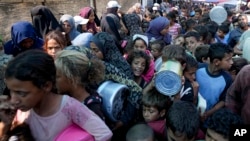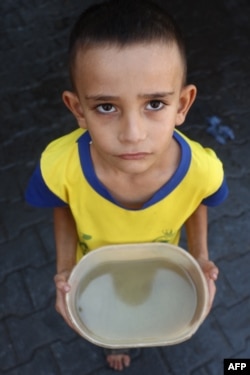A United Nations-backed food security report warned Thursday that most of the residents of the Gaza Strip will face emergency levels of hunger in the coming months and that the threat of famine persists as aid dwindles and winter approaches.
“Famine looms. This is intolerable,” U.N. Secretary-General Antonio Guterres said on social media platform X.
He said crossing points must open immediately, bureaucratic impediments must be removed, and law and order restored so U.N. agencies can deliver aid.
The updated report from the Integrated Food Security Phase Classification, or IPC, projects that over the coming months 345,000 Palestinians will face Catastrophic or Phase 5 level of hunger. Another 876,000 people, or 41% of the population, will be a step behind them in Phase 4 — Emergency level.
U.N. High Commissioner for Human Rights Volker Türk told reporters that the report’s conclusions are “beyond terrifying.”
“They show that the number of people at catastrophic levels of hunger is expected to double in the coming months, and the risk of famine persists across the whole of Gaza,” he said at a news conference in New York. “The world cannot let this happen.”
He said the hunger crisis is “principally the consequence of decisions made by the Israeli authorities” and warned that starvation of civilians as a method of warfare is a war crime.
“As the occupying power, Israel has the specific obligation under IHL [international humanitarian law] to bring into Gaza the necessary foodstuffs, medical supplies and other articles, and to facilitate humanitarian relief by all means at its disposal,” Türk said.
Overall, the IPC said 91% of Gazans — or nearly 2 million Palestinians — will face acute food insecurity. Although less populated, Rafah and the northern governorates will likely face more severe acute food insecurity.
The IPC said that a temporary surge of humanitarian assistance and commercial supplies between May and August helped alleviate acute food insecurity and malnutrition conditions in Gaza, but September saw the lowest volume of commercial and humanitarian supplies entering the enclave since March.
“This sharp decline will profoundly limit food availability and the ability of families to feed themselves and access services in the next few months,” the IPC said. “The upcoming winter season is expected to bring colder temperatures along with rain and potential flooding. Seasonal diseases and increasingly limited access to water and health services are likely to worsen acute malnutrition, especially in densely populated areas, where the risk of epidemics is already high.”
Humanitarian assistance into Gaza has not reached the scale or consistency that the United Nations has been calling for throughout the yearlong conflict.
On Wednesday, the acting humanitarian chief told a Security Council meeting on the humanitarian situation that no food aid entered northern Gaza for the first two weeks of October and that all essential supplies are running out.
“Throughout Gaza, less than a third of the 286 humanitarian missions coordinated with Israeli authorities in the first two weeks of October were facilitated without major incidents or delays,” Joyce Msuya said. “Every time a mission is impeded, the lives of people in need and humanitarians on the ground are put at even greater risk.”
The U.N. has reported similar clearance problems for months. But it also acknowledges that it faces distribution challenges because of lawlessness and badly damaged roads, in addition to Israeli impediments, including making convoys wait for hours until it is dark and unsafe to proceed in a war zone.
Israel disputes that it impedes or restricts aid deliveries into Gaza and largely blames Hamas.
“The real problem is Hamas,” Ambassador Danny Danon told the same meeting. “The terrorist organization steals, stores and sells the aid that enters the Gaza Strip and uses it to feed its terrorist machine and not to feed Gazans.”
The World Food Program said Thursday that without safe and sustained access, it cannot deliver assistance at the required scale. It called again for a cease-fire.


